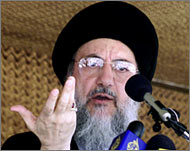Najaf police arrest four bombing suspects
Iraqi police have arrested four suspects in Friday’s bombing that killed a senior Shia cleric and around 100 others in Najaf, and have said that the men have links with al-Qaida.

An Iraqi police official said the men arrested shortly after the attack said the recent bombings were designed to “keep Iraq in a state of chaos so that police and American forces are unable to focus attention” on the country’s porous borders, across which they say suspected foreign fighters are infiltrating.
The spokesman said that the toll from the blast had now reached 107, with more than 200 more injured.
The four men – two Saudis and two Iraqis – arrived in Najaf three days before the Friday bombing and were staying with a friend, who did not know their intentions, the official said.
Another bomb found
Further carnage was averted on Saturday when another bomb was discovered in a car on Saturday in al-Rasoul street, near the Imam Ali shrine, the target of Friday’s attack.
Worshippers were massacred as they streamed out of the shrine where Ayat Allah Muhammad Baqir al-Hakim, the head of the Supreme Assembly for the Islamic Revolution in Iraq (SAIRI), had been leading Friday prayers.
The blast left rescuers scrabbling through the rubble for body parts.
“The dead as of now are 87,” said Isa Muhammad al-Wailee, the city’s forensic pathologist, earlier on Saturday. “Altogether I think there are well more than 200 wounded.”
“Ayat Allah Muhammad Baqir al-Hakim became a martyr” his nephew Muhsin al-Hakim, who is also a top official for SAIRI based in Tehran, told Reuters.
Thousands of Shias waving banners and pictures of al-Hakim later marched through Baghdad, many beating themselves in grief at the cleric’s death. The Governing Council issued a statement calling for three days of mourning from Saturday.
Around half a million Iraqis are heading to the city of Najaf to attend the funeral of al-Hakim. The masses of Shia faithful are expected to arrive in Najaf on Saturday and use the funeral as a platform for outrage at their leader’s assassination, Aljazeera’s correspondents in Iraq reported.
As the burial place of Ali, the Prophet Muhammad’s cousin and son in law, Najaf is holy for the Shia whose most revered leaders descend from the family of the last Prophet.
Back from exile
Iraq’s most influential Shia cleric and a chief opponent of Saddam Hussein’s rule, al-Hakim returned from 20 years of exile in Iran on 10 May to a jubilant welcome from his followers.
He was the brother of Abd al-Aziz Bakr al-Hakim, a member of Iraq’s US-backed governing council.
During the US invasion, SAIRI urged its followers not to oppose the US forces, and to remain neutral, and has called for the UN to take over the administration of Iraq.
Some groups within the Shia community saw this approach as appeasing the invaders, leading to deep political splits.
The group now supports an immediate end to the US military presence in Iraq, and argues that an Islamic republic should be installed through the majority support of the people after an intermediate stage.
Culprits
The announcement of the four arrests in Najaf may have narrowed a wide field of potential culprits. The bombing in Baghdad this month came in the wake of attacks on the embassy of Jordan, an Arab friend of the United States, and on the headquarters of the United Nations, to which Washington is increasingly looking to share the burden of post-war occupation.
Some analysts say all three could be the work of anti-US forces out to wreck Bush’s efforts to create a friendly Iraq.
Shadowy Islamist groups, possibly operating in concert with foreign fighters from the likes of al-Qaida, were widely blamed for the Jordanian and UN attacks, as well as the killings of dozens of US and British soldiers since the war in April.
It was at first thought that Friday’s blast could also have had quite different roots, however.
 |
|
Al-Hakim may have been the victim of Shia rivalries |
As worrying for the prospects of stability in the nation of 26 million may be the accusations in some quarters that the Najaf bombing was another symptom of bitter faction fighting among Shia leaders. One cleric, like al-Hakim newly returned from exile, was hacked to death in the same mosque in April.
A relative of al-Hakim was wounded in a bomb attack last week,
spurring accusations against another Shia leader, Moqtada al-Sadr, who has criticised the US occupation in strong terms.
Sadr, a youthful radical, has denied involvement in the violence.
Warning
“It’s a blow to (US-led) coalition efforts to encourage moderate Shias,” said Toby Dodge, an Iraq expert at Britain’s Warwick University. “It’s also a dire and public warning to all Iraqis with links to the US-led Coalition Provisional Authority and a drive to heighten sectarian tensions.”
The Shias, predominant in areas south of Baghdad, are looking to US plans for representative democracy to give them the upper hand in Iraq after centuries of repression.
But mindful of the big non-Shia minority, Washington is anxious to ensure the Shias’ numbers do not create problems, notably with the Sunni Arabs to the north of the capital, where much of the anti-American resistance is concentrated.
US officials have also made clear they will oppose those Shia clerics whose idea of democracy is clerical rule like that in Shia Iran, still on Washington’s “axis of evil” list.